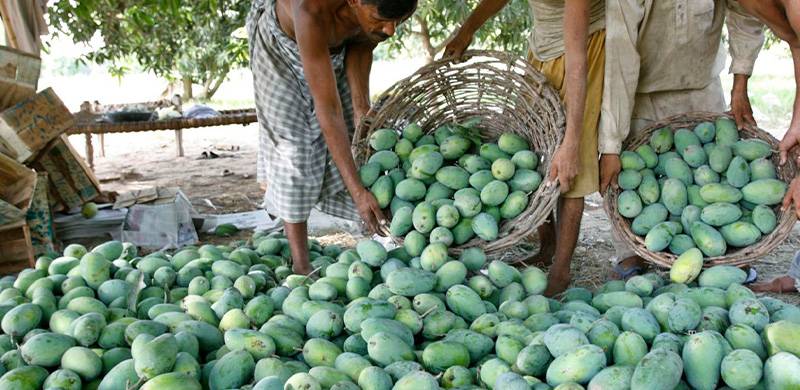
A group of farm workers are packing unripe mangoes into wooden crates. Some of them are loading these crates onto trucks to be carried to markets in the southern district of Mirpurkhas in Sindh, about 50 kilometres from the Sindh Agriculture University Tando Jam.
With the changing climate patterns and shortage of water, this year’s produce is estimated to be half of the previous year. “This has not been a good year. The shortage of water and unexpected heatwave have damaged at least half of the mango crop this year,” says Shakeel Arian, owner of an Arian fruit farm, located near Naserpur, Tando Allahyar. “The size of mangoes has reduced as well.”
Loung Meghwar, a member of the local farming community living in village Kot Jan Mohmmad, has been connected with an agro-field for the last 15 years. He says, “Last year we earned the expected profit from mangoes. We were happy.” But presently, he adds, “our household expenditures have increased due to rising prices of routine items. On top of that, our earning capacity is shrinking gradually”.
Sindh is the second largest mango-producing province after Punjab in the country. A vast variety of mangoes is grown over thousands of acres of farmland, including Sindhri, Langrra, Chaunsa and Dasheri. Pakistan’s annual mango production stands between 1.7 million and 1.8 million metric tonnes. However, due to climate change, mango harvest is worsening. Jacobabad, Nawabshah and Dadu districts in Sindh are experiencing high temperatures of up to 42 to 51 degree Celsius, and River Indus, which is a central source of water for agricultural land in Sindh, has been flowing very low in capacity of late.
“The water table is changing and the trees are not getting proper nutrition from soil,” says Abdul Majeed Nizamani, a senior member of the Sindh Abadgar Board, continuing that mango trees that usually have a life span of 50 years need proper nutrition.
Pakistan ranks sixth in the world as a mango producer. But due to the shortage of water and other changing climate patterns, mango production is taking a hit. Mango farm workers and growers are worried about the future of mangoes in Sindh. “We are struggling to survive," says Loung.
With the changing climate patterns and shortage of water, this year’s produce is estimated to be half of the previous year. “This has not been a good year. The shortage of water and unexpected heatwave have damaged at least half of the mango crop this year,” says Shakeel Arian, owner of an Arian fruit farm, located near Naserpur, Tando Allahyar. “The size of mangoes has reduced as well.”
Loung Meghwar, a member of the local farming community living in village Kot Jan Mohmmad, has been connected with an agro-field for the last 15 years. He says, “Last year we earned the expected profit from mangoes. We were happy.” But presently, he adds, “our household expenditures have increased due to rising prices of routine items. On top of that, our earning capacity is shrinking gradually”.
He says, “Last year we earned the expected profit from mangoes. We were happy.” But presently, he adds, “our household expenditures have increased due to rising prices of routine items. On top of that, our earning capacity is shrinking gradually”.
Sindh is the second largest mango-producing province after Punjab in the country. A vast variety of mangoes is grown over thousands of acres of farmland, including Sindhri, Langrra, Chaunsa and Dasheri. Pakistan’s annual mango production stands between 1.7 million and 1.8 million metric tonnes. However, due to climate change, mango harvest is worsening. Jacobabad, Nawabshah and Dadu districts in Sindh are experiencing high temperatures of up to 42 to 51 degree Celsius, and River Indus, which is a central source of water for agricultural land in Sindh, has been flowing very low in capacity of late.
“The water table is changing and the trees are not getting proper nutrition from soil,” says Abdul Majeed Nizamani, a senior member of the Sindh Abadgar Board, continuing that mango trees that usually have a life span of 50 years need proper nutrition.
Pakistan ranks sixth in the world as a mango producer. But due to the shortage of water and other changing climate patterns, mango production is taking a hit. Mango farm workers and growers are worried about the future of mangoes in Sindh. “We are struggling to survive," says Loung.

